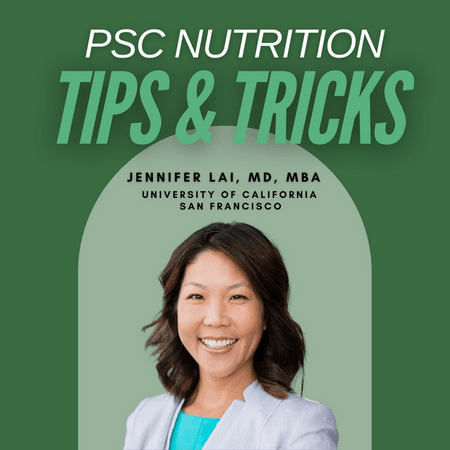Many PSCers have related digestive issues, such as ulcerative colitis and other gastrointestinal problems, and need to stick to a specific diet, as advised by professionals. View the PSC nutrition Tips & Tricks webinar from Dr. Jennifer Lai, MD, MBA, from the University of California, San Francisco, for practical advice on managing nutrition with PSC.
Liver and Your Diet
As PSC progresses, your liver may not be able to process nutrients and toxins as it could when you were healthier, and you may be advised to modify your diet to accommodate your condition. Generally, PSC dietary advice aims to reduce stress on the liver, which may lessen some of the symptoms of liver disease.
- You may be asked to reduce your sodium intake and monitor your potassium, cholesterol, and other nutrients, including vitamins and minerals. Be sure you know exactly which foods and nutrients you need to avoid or add to your diet. Learn how many calories you need to maintain your weight, and how many you need to reach your goal, whether to gain or to lose weight.
- Sodium/salt reduction will help to reduce fluid build-up in the abdomen (ascites). You may also need to restrict your fluid intake. Carbohydrate metabolism is also altered in liver disease, which can lead to increased blood sugar. You may be told to cut down on simple sugars in your diet. A low-fat diet is often recommended, as well.
- If you also have kidney disease, other specialized dietary changes will be necessary. Your doctor and nutritionist/dietitian will help you develop a plan that meets your personal needs.
- Diet issues can be confusing because patients are generally not trained to sort out the complexities, especially with regard to PSC and its related diseases. Well-meaning information from non-professionals, such as friends, other patients, advertisements, etc., should be checked with your doctor or nutritionist/dietitian.
- You may need assistance working through and understanding the importance of certain diet changes. In certain situations, some prescription medications can alter appetite and food metabolism. Your specific diet, if you need one, may not be the same as another PSC patient's. Each person is unique.
Professional Expertise
Nutritionists:
- Ask your specialist to recommend a nutritionist who is knowledgeable about the technical aspects of liver disease. Generally, these specialists are found in large and/or teaching hospitals, and are registered/licensed dietitians who are certified in medical nutrition. PSCers advise that dietary advice from a hospital-related professional will likely be the most precise for PSC. Not all independent dietitians or nutritionists have heard of PSC or understand the complexity of the disease.
Dietary Supplements:
- Some PSCers say they find relief from symptoms if they take certain dietary supplements. If you decide to try supplements, you ought to research them thoroughly and ask your doctor before taking them. Formal research on dietary supplements and PSC is limited. Some supplement manufacturing practices may not be consistent or safe. Some supplements can be toxic to the liver, and you can inadvertently harm it further. Certain herbal products that are OK for healthy people may be harmful to someone with liver disease.
There is no specific PSC diet, and most patients do not have to make any changes, except to continue to eat in a healthy, sensible way.





